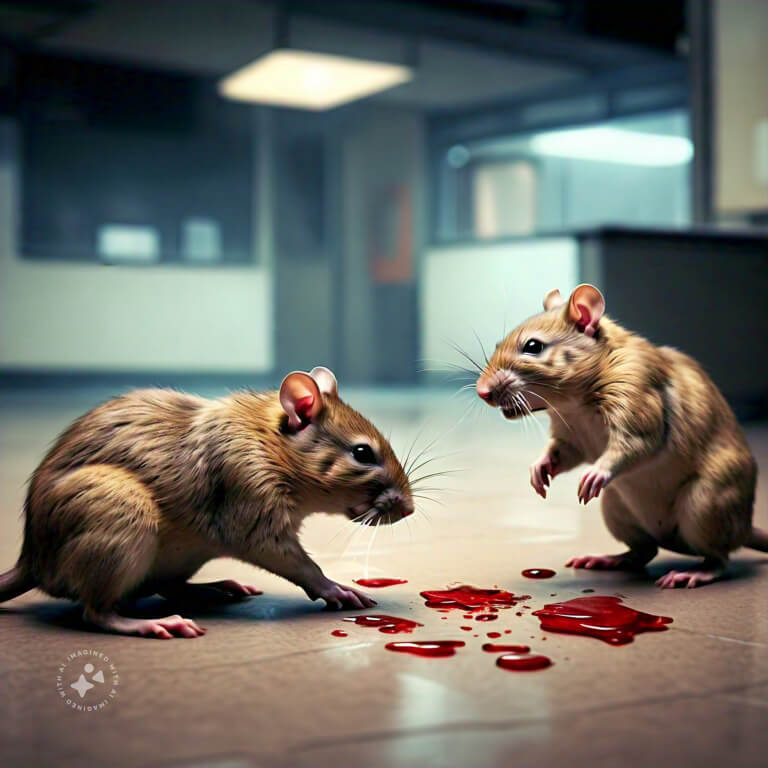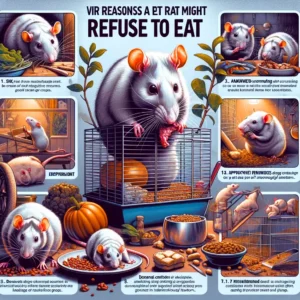Unveiling the Mystery: Why Rats Shun Poison Baits
Rats, often perceived as a stubborn and pervasive pest, have proven to be a significant challenge in pest control measures across various environments. From homes to warehouses, the struggle to effectively eliminate these rodents has led to the question: why are rats not eating the poison baits laid out for them? This article dives into the complexities behind the behavior of rats and explores the reasons behind their increasing resistance to conventional poison baits.
Understanding Rat Behavior and Their Survival Instincts
Rats are highly adaptive creatures with keen survival instincts that guide their daily actions and decisions. One of the primary reasons why rats avoid poison is due to their suspicious nature. New objects placed in their familiar paths, including poison baits, are often treated with caution. Rats tend to avoid new food sources until they are sure they are safe. This behavior, known as “neophobia,” can significantly reduce the effectiveness of poison baits.
Chemical Sensitivity and Taste Aversion in Rats
Another critical factor in the ineffectiveness of poisons is the rat’s sophisticated sense of taste and smell. They can detect chemical substances in their food that may be harmful. Over time, rats may also develop a taste aversion, learning to associate the smell or taste of a particular poison with the symptoms it causes. If a rat survives an encounter with poison, it is likely to avoid it in the future, and may even pass on this avoidance behavior to its offspring.
The Role of Bait Shyness and Genetic Mutation
Rats exhibit a behavior known as bait shyness. Once they ingest a sub-lethal dose of poison and experience adverse effects, they are likely to develop an aversion to that specific bait. This learned avoidance can quickly spread throughout the colony, rendering the poison ineffective. Furthermore, genetic mutations have allowed some rats to develop resistance to certain types of poisons, making it even more challenging to control these populations using traditional methods.
Innovative Approaches to Rat Control
Given the adaptability and intelligence of rats, pest control strategies need to evolve. Integrated pest management (IPM) approaches that combine various control methods, such as traps, baits, and environmental modifications, are recommended. Employing non-toxic baits for initial trapping and surveillance can help reduce bait shyness and improve the effectiveness of subsequent poison applications.
In conclusion, the reasons rats avoid poison baits are complex and rooted in their innate survival strategies. Understanding these behaviors and adapting pest control methods accordingly is crucial for effectively managing rat populations and mitigating their impact on human environments.
Taste Aversion: Exploring Why Rats Avoid Poison

Rats, often deemed the ultimate survivors in the urban ecosystem, have developed sophisticated survival mechanisms over time. One of the most intriguing behaviors observed is their aversion to certain poisons, which can be primarily attributed to their highly evolved sense of taste and communal learning. This article delves into the phenomenon of taste aversion among rats and explores the scientific and environmental factors that contribute to this behavior.
Understanding Taste Aversion in Rats
Taste aversion is a biological mechanism where an animal, after consuming something that makes it ill, develops an aversion to that taste. Rats, in particular, have a keen ability to associate the taste of food with illness, making them less likely to eat the same food again if it previously made them sick. This behavior is crucial for their survival, as it helps them avoid potential toxins in their environment.
The Role of Neophobia in Rat Populations
Rats exhibit a behavior known as neophobia, which is the fear of anything new. This trait is particularly strong when it comes to their food sources. When introduced to a new type of food (including poison), rats will typically sample a very small amount and wait to see if there are any negative effects before they consume more. This cautious approach allows them to assess the safety of new food items without exposing themselves to a lethal dose.
Genetic and Environmental Influences on Eating Habits
The dietary habits of rats are not only influenced by immediate threats but also by genetic and environmental factors. In areas where rat populations have been exposed to poison for generations, there seems to be an evolutionary shift towards increased wariness or even genetic resistance to certain poisons. Environmental factors, such as the availability of alternative food sources, also play a significant role in whether rats resort to eating poison.
Implications for Pest Control
Understanding the reasons why rats avoid poison has significant implications for pest control strategies. Traditional methods that rely on poisoning might not be effective if rats are able to detect and avoid these toxins. Consequently, pest control experts are turning towards more integrated approaches that combine the use of safer, less detectable poisons with traps and habitat modification to reduce rat populations effectively.
In conclusion, the avoidance of poison by rats is a fascinating example of adaptive behavior driven by the need for survival. By studying these behaviors, researchers and pest control professionals can develop more effective methods to manage rat populations, keeping our urban environments cleaner and safer for everyone.
Smart Survivors: Understanding Rat Behavior and Poison Avoidance
Rats are often depicted as nuisances in both urban and rural settings, notorious for their ability to survive and thrive in various environments. However, what is less commonly discussed is their remarkable intelligence and adaptive behaviors, especially in how they avoid dangers such as poison. This article explores the intricate behavior of rats and their sophisticated methods of eluding eradication attempts through poisons.
The Science of Neophobia: Rats’ Fear of the New
One of the primary reasons rats avoid poison is due to a behavioral trait known as neophobia—a fear of new things. Rats are highly cautious creatures that often avoid new objects introduced into their familiar environments for several days until they are certain these objects pose no threat. This survival strategy is particularly problematic when placing new poison baits. The delay in interaction allows rats to observe the reactions of other rats (which may consume the poison and die), thereby learning to avoid these dangerous items.
Chemical Detection: Rats’ Acute Sense of Smell
Another key factor in rats’ avoidance of poison is their acute sense of smell. Rats rely heavily on their olfactory abilities to detect the presence of chemicals in food. Many rat poisons are formulated with chemicals that have odors detectable by rats. Once a rat identifies an unfamiliar chemical scent, it is likely to avoid consuming the substance, thereby circumventing potential poisoning.
Social Learning: The Role of the Rat Pack
Rats are not solitary creatures; they live in packs and exhibit complex social behaviors, including social learning. When a rat observes another rat falling ill or dying after consuming a substance, it learns to associate that substance with danger and avoids it. This behavior is a crucial survival mechanism, as it allows entire groups to quickly adapt to newly introduced threats.
Developing More Effective Strategies
Understanding these behaviors is essential for developing more effective rat control strategies. Traditional poisons often fail because they do not take into account the adaptability and learning capabilities of rats. By incorporating knowledge of rat behavior, pest control measures can be adapted to be more enticing and less detectable as threats, potentially improving eradication success rates.
In conclusion, the reason rats often do not eat poison lies in their complex behaviors and survival strategies. Their intelligence, caution, and ability to learn socially make them formidable opponents in pest control scenarios. By respecting and understanding these aspects of rat behavior, humans can devise more effective and humane methods to manage rat populations.
Chemical Cues: How Rats Detect and Dodge Poison
Rats have long been considered formidable survivors in the urban landscape, thriving in environments densely populated by humans. Their remarkable adaptability extends to avoiding dangers such as poisons that are commonly used for their control. The intricate dance between humans attempting to manage rat populations and the rodents’ survival strategies is a testament to the evolutionary arms race. This article delves into the science behind how rats use chemical cues to detect and avoid poisoned baits, shedding light on their acute survival instincts.
Understanding Rat Sensory Capabilities
Rats possess highly developed sensory systems that are fine-tuned to detect threats and opportunities in their environment. Central to their survival toolkit is their keen sense of smell, which allows them to detect chemical cues and potential toxins in their food sources. This olfactory prowess means that rats can often identify the presence of poison in food that otherwise appears normal to humans.
The Role of Neophobia in Rat Behavior
Neophobia, or the fear of new things, is a behavior exhibited strongly by rats. This trait serves as a protective mechanism, particularly when it comes to their food choices. Rats are cautious with new objects and substances in their environment, including food. When a new food item (like poison bait) is introduced, rats might initially nibble a tiny amount and wait to see if it makes them sick. This hesitancy allows them to detect any ill effects from minor doses of poison, enabling them to avoid more lethal quantities.
Genetic Adaptations and Learned Behaviors
Research indicates that some rat populations have developed genetic mutations that make them resistant to certain types of poisons. Additionally, rats can learn from the experiences of their peers. If a rat observes another rat becoming sick or dying after consuming a particular substance, it will avoid that substance in the future. These learned behaviors are passed down through generations, making entire colonies increasingly difficult to control with the same types of poison.
Implications for Pest Control Strategies
Understanding the sophisticated ways in which rats avoid poison has significant implications for pest control strategies. The knowledge that rats are capable of detecting chemical cues and learning from past experiences can assist in the development of more effective control measures. Techniques that vary the type of poison used, combine mechanical traps, and incorporate integrated pest management strategies are likely to be more successful in managing rat populations.
In conclusion, the ability of rats to use chemical cues to detect and dodge poison highlights their adaptability and the challenges faced in controlling their populations. Advances in understanding rat behavior and sensory capabilities are key to developing innovative and effective strategies to manage these resilient urban dwellers.




